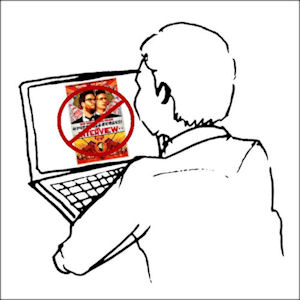In December 2014, Sony Pictures Entertainment was scheduled to release on Christmas day a film called The Interview, a comedy starring Seth Rogen and James Franco (who previously worked together in other movies, such as the stoner comedy Pineapple Express). Within two weeks of that release date, computer hackers broke into Sony's computer system and stole lots of sensitive information, including business-related e-mails, financial reports, and even an early draft script for the upcoming James Bond movie Spectre. One might think that this hacking incident is no different from similar events affecting other businesses, including consumer information stolen from major retailers like Target and Home Depot where investigations had begun but with business otherwise going on as usual for the most part. Instead, the Sony hack had an unprecedented consequence: the threat of a movie release cancellation.
Yes, you heard that right. A cancellation. Not a postponement with a new release date, but an indefinite cancellation. What made this even more ominous was when Sony, at one point, took down its Facebook and Twitter pages promoting The Interview, and even remained silent on plans to release the movie on DVD, Blu-Ray, or video on demand. We could've actually lived with the sad situation of The Interview being a completed film that would never see the light of day among the general public, all because of hackers who were presumably too sensitive to the content of the film.
In case you don't know by now, The Interview is about two men from an entertainment news show that North Korean leader Kim Jong-un is a fan of, and the two men have the opportunity to come to North Korea to interview Jong-un. But the CIA sees a different opportunity: the two men could be used to help assassinate the North Korean dictator. That should be enough for everyone to understand the speculation that the hackers targeting Sony were from North Korea and did so in protest of this satirical movie that they found offensive.
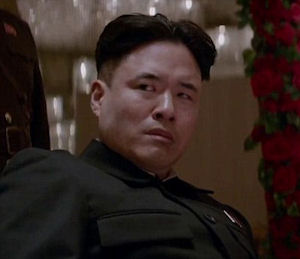
Kim Jong-un as portrayed in The Interview
But you know what? This is hardly the first time that a movie can be very offensive to certain people.
For instance, do you remember the 2004 movie
Team America: World Police, an action comedy featuring a cast of puppets? If you do, then you remember that the movie satirizes Kim Jong-il, the father of Jong-un who ruled North Korea before he died. I don't remember North Korea speaking out against the film, at least not as loudly as with The Interview. Speaking of cinematic ridicule of dictators, the 1999 animated movie
South Park: Bigger, Longer, and Uncut features Iraqi leader Saddam Hussein as Satan's gay lover. As far as I know, the Iraqi government banned that movie from being shown within its borders. Then there is
Hot Shots! Part Deux, featuring Saddam Hussein in a scene that spoofs
Star Wars and
Terminator 2: Judgment Day.
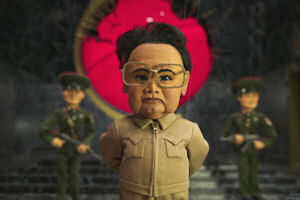
Kim Jong-il as portrayed in
Team America: World Police
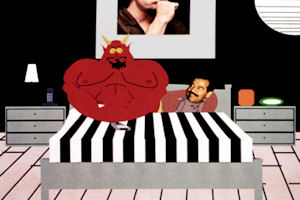
Saddam Hussein as portrayed in
South Park: Bigger, Longer, and Uncut
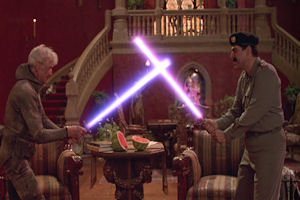
Saddam Hussein as portrayed in
Hot Shots! Part Deux
In the examples I just cited, there wasn't any unbelievably tremendous backlash against the movie. Sure, there were likely feelings of shock and disgust, but in the end, the satirical portrayals were brushed aside. And that is the key to not overreacting to satire: understanding that it's not a threat as one might assume. If you think about it, very few people are stupid enough to see satire and take it seriously as if it were fact. Even if those idiots try to take action, they would simply be overwhelmed by the opposition. So in the case of The Interview, North Korea should not worry about ordinary people working to attack their country after seeing the movie, let alone actually carry out attacks. And if they're upset because the person portrayed is not presented in a respectable light, they should remember this: with billions of people in the world, it's unrealistic to assume that no person will dislike you for whatever reason.
It's also important to remember that the United States, the country where Hollywood is located, thrives on freedom of speech and expression. The way I see it, free speech gives people with good ideas the chance to share them. Yes, there will be people trying to promote bad ideas, but that can be countered with the speech from the opposite viewpoint, and whichever carries greater influence will prevail. That's better than significantly restricting speech, because the effort to suppress ideas you think are bad may inadvertently suppress ideas that are actually good. So this is why some Hollywood movies can be intentionally offensive but still enjoyed by plenty of people. Any other country that may dislike certain Hollywood movies can choose to ban them, like what Iraq did with the South Park movie. North Korea could simply do the same by banning The Interview, instead of hacking into a movie studio to stop its release, an action that is, essentially, a form of invading another country's borders.
Even as I have discussed some ways to peacefully respond to offensive movies, is it possible for a movie to be too offensive for anyone?
Simply put, the answer is yes. Freedom of speech (and by extension, filmmaking) may be broad, but it's not absolute. There are certain topics that are taboo and very hard to discuss out in the open, like cannibalism, child sex abuse, incest, and bestiality. Obviously, any attempt to artistically portray such subject matter, particularly in graphic detail, may lead to charges of obscenity. When it comes to films, the most grotesque and sickening movie I ever heard of is a horror film from the Netherlands called The Human Centipede, directed by Tom Six. (WARNING: THE NEXT SENTENCE ABOUT THE MOVIE'S PLOT IS GRAPHIC AND NOT FOR THE FAINT OF HEART.) It's about a deranged surgeon who sews three human victims to each other, mouth to anus, to form one continuous alimentary tract through three individuals. I have not seen the movie (and I'm not sure if I ever will), but I do know that film critic Roger Ebert wrote a review of the movie and gave it no stars, which he distinguished from a formal rating of zero stars. Basically, Ebert felt that a movie like this didn't even deserve a star rating to begin with.
That, of course, is a relatively extreme example, and some people who have seen that movie have noted that the level of graphicness is not as much as one might think. With that in mind, there can be movies that are intensely offensive but still manage to have a noticeably supportive audience. Two films definitely come to mind:
Borat and
Bruno, both starring Sacha Baron Cohen delivering exceptionally daring performances as characters completely different from his real-life self. The two films are comedies in the style of fake documentaries, where the star plays a fictional character but does outrageous and humiliating things to real unsuspecting people in order to elicit honest responses. Whether you're watching Borat chasing his companion through a hotel while naked, Bruno kissing a man at a cage-fighting event, Borat trying to kidnap a certain female celebrity, or Bruno showing video of his own penis, you cannot help but react with laughter, disgust, or both. There are no doubt people out there who hate these movies for their offensive content, but you can't ignore those who feel the opposite way.

Sacha Baron Cohen as culturally backwards Kazakh journalist Borat

Sacha Baron Cohen as flamboyantly gay fashion reporter Bruno
And this leads us to the other important thing to remember about offensive works of art. It's not just the artist who can be very offensive. it's also the audience who can be very sensitive. If you think about it, any movie can be offensive to at least one person in the world for whatever reason. For example, when the Eddie Murphy comedy
The Nutty Professor hit theaters in 1996, I heard about some people who felt that the film portrays overweight people negatively because of moments involving overeating and passing gas. To be fair, the feeling is understandable, but at the same time, I also noticed that perspectives of overweight people hadn't changed dramatically just because of that one movie. I could go on and on about relatively milder movies that are nevertheless offensive in some way, but instead, I'll just end it with the most absurd example I've seen. When
The Lord of the Rings: The Two Towers was released in 2002, there was an outcry from a couple of people who thought the title was an insult to victims of the September 11, 2001 terror attacks in New York. That protest was quickly silenced by the overwhelming counterpoint that J.R.R. Tolkien wrote that story in the 1950s, way before 9/11 happened.
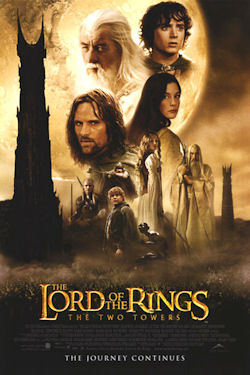
Offensive? Hardly.
So if you want to live in a world where no offensive movies exist, then you might as well live in a world without movies at all. Therefore, all of us movie lovers must compromise. We should all understand that no movie will be 100% non-offensive and that we can live with offensive movies as long as we do three things: (1) freely express negative feelings about a movie, (2) allow others to express their feelings about the same movie, whether positively or negatively, and (3) accept whatever the majority opinion is. This is the reality we must get used to if we want creative people to not have major restrictions against expression so that we in the audience can have a variety of works to explore and experience.
In conclusion, a movie can be too offensive for everyone in extreme cases, but otherwise, it is up to us to express what we think of certain movies and accept, not fight, the direction guided by the majority. If all of us can take this to heart, then we can surely enjoy whatever movies we like and respect others who enjoy the movies we don't like. Only then can movie making and movie watching be a win-win for everyone.
